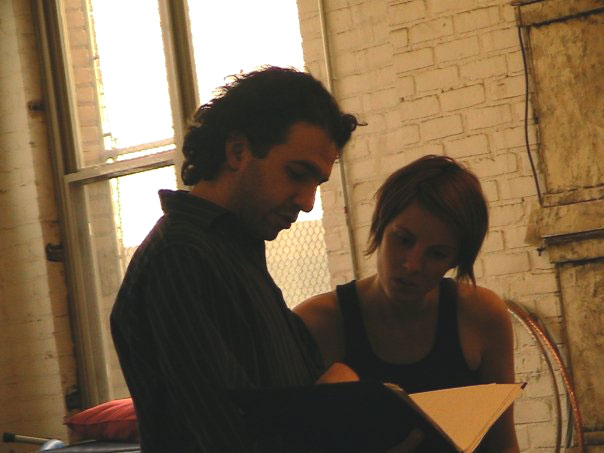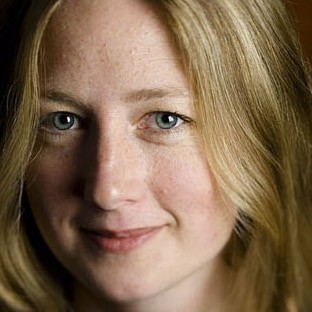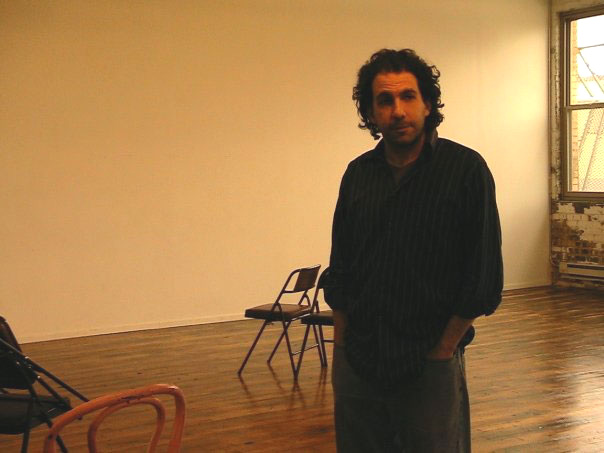Around the Playwrights’ Table
Minnesota Playlist's Alan Berks talks shop with his fellow Workhaus Collective playwrights about collaborative theater and the nuts and bolts of taking a show from the page to the stage, in an interview formatted, appropriately enough, in script form.




Characters:
DEBORAH STEIN: 5’4″. Minneapolis-based playwright. Recipient of many awards including two Jerome Fellowships and the Bush Foundation Fellowship. Self-described as collaborative theater girl, loudly thoughtful and gently opinionated. Member of the Workhaus Playwrights Collective in Minneapolis.
SOLVEIG HOLUM: Called Suli. 5’2½”. A theater artist (performer, writer, director), based in Brooklyn, New York who has collaborated across disciplines to create a wide range of performance experiences. A co-founder of the acclaimed Pig Iron Theatre Company in Philadelphia (where Deborah Stein originally began as a playwright).
TRISTA BALDWIN: Also, a member of the Workhaus Collective. The top layer of her hair is straight but underneath the very surface there are waves. And in some spots, downright kinky curls. This variation on the top of her head, this persistence to be more than one thing, gives a clue as to what lies just under. Leaving for Japan as she wrote that self-description, post-interview, where she will be doing additional work on her collaborative project, Doe 2.0, with Japanese artist Shirotama Hitsujiya, Artistic Director of Yubiwa Hotel.
ALAN BERKS: The interviewer. Average height. Too thin. Looking for a way to make plays that aren’t so wordy. Working on one, #Ringtone, for the 2010 Minnesota Fringe Festival. Also, a member of Workhaus.
The situation:
Later in the day, Suli and Deborah will head into the theater with a set designer, sound designer, videographer, and a minimal script with some words on a page to continue creating a play titled Chimera.
Chimera, Workhaus’s third production of the season (after Music Lovers by Alan Berks and The Sense of What Should Be by Dominic Orlando) is not yet a play at all. Audiences have been invited to see the play as it develops over the course of four public presentations, June 4, 6, 10, and 11.
The set:
The lobby of the Playwrights’ Center in Minneapolis, a square space with a bench, couch, and hardwood floor. Two doors lead into the theater, one stairway leads to an exit onto Franklin Avenue and then further down the stairs into the Playwrights’ Center offices in the basement. The curtains over the windows are bright red and a little translucent.
Trista and Deborah sit on the black leather couch between the two bathroom doors. Suli and Alan sit in red chairs that were pulled from the theater audience.
ALAN
When most people think of playwrights, they probably imagine somewhat lonely people at a desk, crafting delicate language to be performed by good-looking, sociable actors later — that image from Shakespeare in Love, for example, when he returns to his quill and his desk after he’s had some life experiences.
But you’re actually rejecting that model, instead working with actors and designers directly and creating plays while in a rehearsal room surrounded by other people. Where does this come from?
SULI
At Swarthmore College [where Deborah and Suli both went to school], we studied Ariane Mnouchkine, Theatre Complicite, the Open Theater, Joe Chaikin. And we learned about Lecoq, which is a school in France where people are trained as performer-creators.
ALAN
So, Pig Iron Theatre Company came out of that?
SULI
Yes, Pig Iron came out of that. And I think it is relevant that Swarthmore is a Quaker school, that we all came out of the school believing in consensus. . .
(Right — I hear some laughter happening … )
It was very time-intensive to do a production that way, very labor-intensive. We would have rehearsal, then we would have administrative meetings, then we would have something we called creative meetings which would be a time for us all to sit around and talk about this “play map,” talk about all the ideas that were on the table and how to filter everything in.
ALAN
In a way, Workhaus Collective — where playwrights are consciously leading the organization to produce work, rather than simply renting their finished scripts out to other organizations –was also created to overturn some of the ways that theater has been created in America in the past. (Though it’s worth noting that not all Workhaus plays are created using this model; Workhaus productions serve the playwright in whatever way the playwrights asks.)
Why do you think Workhaus exists?
TRISTA
When I was starting out, I was excited about whatever production of my play actually happened; like, “Wow, look at what they did.” I was a pretty open-minded playwright, who worked really easily with directors, because I just liked to see what people did [with what I wrote].
Now, I’m kind of over that; I am just not finding a lot of satisfaction in productions. In part, it’s because of our sped-up process. We have — what? — three weeks to rehearse things? I feel like, a lot of times, we’re watching theater that is just beginning; a lot of what’s on stage has just been started, it’s not finished. We don’t have a lot of time to work with each other. So, I kind of feel like — I don’t know if I’m speaking to what Deborah and Suli are doing, but I know with Shirotama and I — we want three years, not three weeks, to develop this.
Three years: to think and work, and stop, and think and work again, because I don’t … We want it to be good, and we want the play to be performed, but we also want it to be ready. … I’m very weary of the current process. Okay, I understand there are financial limitations; but [I also think that] we, as artists, have to take control of that, regardless of what’s going on with the economy, and just say, “Let’s take some time to make something.”
DEBORAH
Our process [for creating Chimera] is also a three-year process, and we’re at the very beginning of it now. We’re talking about making something, we’re actually not writing something; it is the difference between a play as literature and a play as performance. And by ‘play as literature’ I mean something that’s mostly “done” and “ready for performance” when it starts rehearsal, a play which just needs to be to slotted into the kind of [three-week] process that Trista is describing.
A play hasn’t been created collaboratively up to that point. It’s been created by one person, and it’s gotten to be where it is because it reads well on the page, which has nothing to do with how it actually performs in space. Sometimes a play that reads well on the page also works well in space, and sometimes it doesn’t, but there’s a leap. And I think it’s an unnatural leap when you think about theater, especially in the 21st century; there are certain things that contemporary theater does really well, and that has to do with live people in the space together sharing something.
SULI
I think this is happening more; this collaborative model of theater-making is linked to a heightened interest in creating work that’s interdisciplinary, in creating work that both has text and also has [spontaneous] moments that can’t be put down on the page.
TRISTA
What I want is to be able to work alongside an auteur director, in the sense that I want someone to meet me with the same kind of viciousness as I approach with the writing. I want an equal. My experience is not that I’m being revered by all these people talking about my play; actually, I sort of feel like I’m being treated like this… um, I don’t know … sort of like this little invalid, sometimes —
DEBORAH
Yeah.
TRISTA
But not always. Sometimes [the experience] is wonderful — many times it’s wonderful. But sometimes it seems like there’s this loooong nursing process at play, like you’re weaning the play you wrote, so it can take little steps into a room, finally, walking with people.
In the meantime, a lot of sexy work has been happening by companies like Pig Iron, productions that don’t have writers [in the conventional sense], so there’s this feeling … that the really cool artists are not working with playwrights. There’s been this interesting divide. Playwrights are working collaboratively around a table, talking —
DEBORAH
Right, right.
TRISTA
— and these people, over here, are getting up and moving, and they have dancers and musicians, and I’m like, “Hey, I want that dancing. Hey, I want the musicians. And *that’s really what it’s about —
DEBORAH (*overlapping)
And that’s what theater is. *That — that’s the theater!
TRISTA (*also overlapping)
That’s what theater is, right? Why are we separated from theater? It’s like we, as playwrights, are put over in the literature box.
ALAN
That’s actually … that’s probably the impulse I have, too. “Wait, I don’t want to be sitting at the playwrights’ table! But you guys needs a writer, so how about me? I want to play with you guys. I have a skill. I can do it.”
TRISTA/DEBORAH (in unison)
Yeah.
SULI
One of the driving forces for each member of Pig Iron was this idea that the reason you make work is to crack a code you haven’t cracked yet, to learn something, to get better at something, to fail and then get better. I feel like this is also really lacking in the structure of: You come, and you bring your presented [finished] play. [Or, as an actor,] you audition exactly as you’re going to play the part on the night you open.
Everyone has to come to the table — it’s a very, it’s a — yeah, it’s a marketplace, and you’ve got to bring your “A Game” in the marketplace. But there is this other way of creating which is: Let’s swim in the mess of I-don’t-know-what-this-is and then, as a group, we’re going to get better at something.
ALAN
This raises the question of accessibility and audience. Though there are some companies that have been successful with this process, in the sense that they can survive financially — Pig Iron, Minnesota’s Theatre de la Jeune Lune for a while, The Civilians in New York — there is also this feeling that text-based work, where the script is completed before you begin rehearsal, is more accessible, that it’s what more people want to see.
It’s certainly easier to transfer, right? You can give the script to a community theater, and they can do your play, but there is also a feeling that this more collaborative kind of work is less accessible.
DEBORAH
I guess I would ask: Who has that feeling? I think it is related to a generational shift, to who is seeing theater now. Even in Minneapolis, I’m more likely to get sold out of a Live Action Set show than I am to get sold out of a Mixed Blood show.
ALAN
I don’t want to burst your bubble on that, but Live Action Set is often doing shorter runs or playing smaller venues.
DEBORAH
Sure, but I’m just saying what it feels like to be there. It feels like people want to be at a Live Action Set show, and I see people there that I don’t see at any other theater. The average age of the audience [at these more collaborative shows] is younger. And I never have a feeling, going to one of Live Action Set’s shows, that I have sometimes have when I go to a mid-sized theater in any similar-sized market, where I’m one of maybe seven people in the audience. So, this feeling of “who is it accessible to?” and “who’s going to see that work?” —
TRISTA
What’s “accessible”?
DEBORAH
I think that has to do with [which critic] is writing the story, who’s driving the media narrative. And I think [that perception of accessibility] is actually about the fact that the media narrative, and the funders, are late to the table when it comes to assessing who’s actually going to see what work.
ALAN
Let’s talk about the work you’re doing right now.
SULI
It really started with me having a baby. I was working as a freelance actor, and then my husband and I started a family, and I sort of had this rush like, “Oh man, I really have to get back to making my own work, because I can’t function in a family and be this freelance actor.” I felt that you can’t build a life that way; you don’t get to build a life that way. You have to go where people tell you to go. You never know what’s coming. And also, I felt like [as a freelance actor] I was only operating at 10% capacity.
So, I started wondering, who can help me step back into this world? And I immediately thought of Deborah. We hadn’t gotten to collaborate with each other since I left Pig Iron. I had these ideas that were sort of floating around, so I just called her one day. I pitched three ideas to Deborah, and she was excited about the one that became Chimera.
DEBORAH
There was this Radiolab episode that Suli sent me — a real life horror story of this woman who, in late middle age, discovered that she was her own twin. What happened was, she needed a kidney transplant, and she had three adult sons. They were each tested to see if they would be matches to be kidney donors. And it turned out that not only were none of the sons matches, they were, based on the review of their DNA and her DNA, not biologically her sons.
Were they switched at birth? What happened? But they were all related to each other, and they were all related to their father, her husband, so it was this medical mystery. She was accused of switching things at birth, or implanting herself with another woman’s eggs. Eventually they started taking DNA samples from all over her body and discovered that she had two different sets of DNA.
It’s a result of something called “Vanishing Twin Syndrome,” and the actual medical condition that she has is called “Chimerism.” In her mother’s womb, she was one of two twins, and one of the twins didn’t make it. But it happened so early in the gestation period that the embryo that became this woman absorbed the genetic material of this other person, but [the merging of the twins] happened early enough in the process that she [was born with] no visible evidence. Apparently, if it had happened four days later, she would have been a Siamese twin — the moment was that crucial. So that’s where we’re starting with this piece.
The challenge, and the reason I wanted to do it, is it’s a great story to tell, but it takes about ninety seconds, and then you’re like, “Now what?” I told Suli that that was the pitch I was really excited about, and her first question to me was, “Yeah. It’s really interesting *but what’s theatrical about it?”
SULI (*overlap)
I don’t see how it’s theatrical.
DEBORAH
And that, to me, was why it was exciting, because finding the theatricality for a story is really exciting to me.
ALAN
When people come to see you work out these issues in this presentation of Chimera, you’re asking them to pay for a process that isn’t finished.
TRISTA
It’s economical. It’s not a lot of your time, and it’s not a lot of your money. You come in. You have a drink. You see what’s going on. You can talk about it. And then you come back.
DEBORAH
It’s only five dollars.
ALAN
Is there a comparable experience that people have at some other public place?
DEBORAH
It’s like an artist’s open studio tour.
ALAN
So, you’re comparing it to Art-a-Whirl, where artists invite people —
DEBORAH
Or, Trista compared it to spring training, which I thought was really —
ALAN
Baseball?
DEBORAH
Like, people will pay to go watch the new players —
TRISTA
And then, you pay more later to watch them in a game.
DEBORAH
Like the people who just moved up from Triple A.
ALAN
So, this particular production, or showing, of Chimera is sort of an early spring training thing, but there will be one day when it’ll be done, and it should have a different, wider audience; and, at that time, it’s reasonable that the audience should have different expectations for it?
DEBORAH
Yes.
SULI
Though, wouldn’t it be great if that later audience grew from this one, the audience that has been with the play from the beginning, that knows it —
DEBORAH
Yes — my hope is that some people will come the first week, and then come back the second to see what we have changed. Then, maybe they’ll come back next year. Then, they’ll come back in two years …
________________________________________________________
Related performance:
Chimera, co-created by Deborah Stein and Suli Holum and presented by the Workhaus Collective, is on stage at the Playwrights’ Center for a couple of additional performances, June 11 & 12.